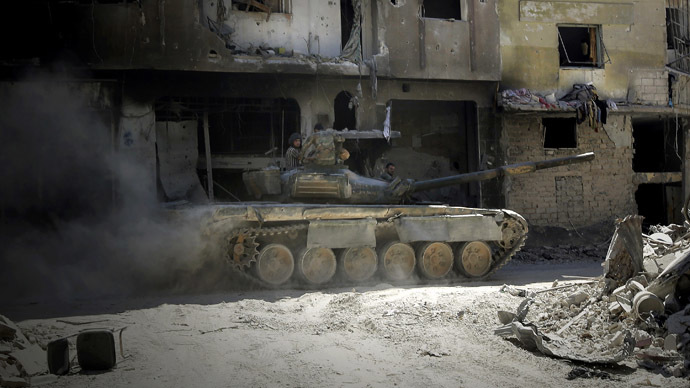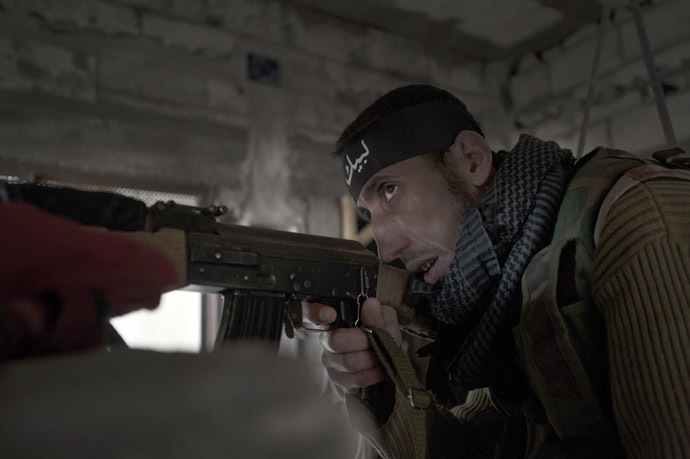Syria is a battle ground for Saudi Arabia’s confrontation with Iran over regional dominance

If the US and France start military action in Syria it will create “pockets” of Al- Qaeda-linked Islamic extremism across the country, and could trigger global conflict, Jeff Steinberg, senior editor of the Executive Intelligence Review, told RT.
RT:So, there are concerns that insurgent violence in
Iraq could be linked to the civil war in Syria. Do you think
there is a connection?
Jeff Steinberg: Well, I think there is a connection both to
the events on the ground in Syria, in Lebanon, in Egypt, and,
quite frankly, for a month now the Saudi government has been
pouring money into Sunni insurgence, who’ve been a major part of
the violence and terrorism going on in Iraq. And it’s a part of a
larger regional strategy, basically promoting a Sunni vs. Shia
conflict, which has a big geo-political factor of Saudi Arabia
competing with Iran for who’s going to be a dominant power in the
Gulf region.
RT:Do you think there’s a danger that more countries
of the region may be affected by what’s going on in south of Iraq
and Syria?
JS: Very definitely. Already the situation in Iraq and
Syria has spilt over very violently, inside Lebanon. There are
not only Hezbollah fighters inside Syria fighting in conjunction
with the Assad's government, but you now have Sunni radicals who
have moved from Lebanon into Syria. And so you’ve got in effect a
many civil war in Lebanon, playing out on Syrian territory, but
very soon it’s likely to spill back over into Lebanon, which of
course went through 15 years of a terrible civil war, sectarian
violence from the mid 70-s into the early 90-s.

RT:Iraq has seen some of the effect of the foreign
intervention. How much, do you think, this affects Baghdad’s
policy toward the calls for a strike on Syria?
JS: Well, I think that Iraq is in a kind of very delicate
position. They, of course, border on Saudi Arabia; they know
they’ve got a problem on Saudi funded insurgency inside their
country. They have certain alliances, but not a kind of hard
alliance with Iran, and they really struggle to get beyond the
whole experience of several decades of war that guided much of
the royal production and infrastructure. I think, they’re in a
difficult position overall and I don’t think that they are
driving faster in this battle. The al Qaeda, Sunni
insurgence operating inside the Iraq has now crossed over
into Syria, so in a certain way, the violence that has picked up
tremendously inside Iraq, is a kind of reverberation back there
of the crisis centered in Syria. So I don’t think they’re major
driving forces, but they certainly rid them of the spreading of
the conflict across the entire region.
RT:As we know, the Syrian opposition is pretty fragmented, there are several groups involved, including ones from Iraq, which may have a different agenda from kind of the mainstream opposition members. What do you think, we can expect from an end to the conflict, if there is an ultimate collapse of the Assad regime?
JS: If you have a collapse of the Assad regime, and
this is something that General Martin Dempsey, Chairman of the
Joint Chiefs has been warning about for months. Then it’s likely
that Syrian territory will be fragmented and there will be areas
in the country, particularly along the Turkish and Lebanese
borders and maybe in the South near the Jordanian border. And
that will be “will pockets” of Al Qaeda linked Islamic extremism,
and that poses a great danger to all of the bordering countries,
of course. Israel has already carried out major bombing attacks
against Syria and I think that we could very easily conceive a
brake in stability in Syria, collapse of the regime into a kind
of a wall-estate, that Israel would not sit back, but would
intervene very forcefully and then you’ve got the seeds of a
much-much bigger regional conflict that could draw the United
States and, perhaps, even Russia in. This could go global and
many people are very frightened of that danger.
The statements, views and opinions expressed in this column are solely those of the author and do not necessarily represent those of RT.












